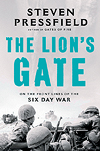
The Lion’s Gate: On the Front Lines of the Six Day War, by Steven Pressfield, Sentinel, New York, 2014, $29.95
One of the great ironies of modern warfare is the Israel Defense Forces’ admiration of the decisive tactic employed by Nazi German forces as they blew past mainland European defenders during World War II. Given Israel’s small size and lack of depth, it makes perfect sense.
In June 1967 Israel was surrounded, outnumbered and outgunned by Arab forces looking to destroy it. Yet its dedication to blitzkrieg and its own concept of en brera (“no alternative”) produced decisive victory on multiple fronts in six days.
The story, author Steven Pressfield acknowledges, has been told and retold. Pressfield’s new book, The Lion’s Gate, takes the reader through the war in a new and unusual fashion, cobbling together a patchwork of first-person accounts into narratives that offer insight as to what participants were thinking as well as doing. Early scene-setting passages drag in spots, but once the action begins, the author sets a nimble pace. The recollections, presented in historical present tense, have a vivid immediacy, and you’ll find the book impossible to set down.
“To pull the crew out of a burning tank, a man must go in face-first,” recalls Tani Geva, a recon trooper. “He reaches in with his hands and arms. The tank crewmen are screaming in pain and out of their minds with fear. The interior burns like a furnace. High-explosive shells are cooking half a meter from their face. When you witness this, when you do it yourself, you cannot believe it.”
Pressfield doesn’t only quote participants who survived the conflict. In a controversial tack he also blends some recollections with speeches and passages from the published works of his subjects. He takes greatest license with Israel’s central figure in the war, Lt. Gen. Moshe Dayan, who became the country’s minister of defense on the eve of the fighting. Pressfield never interviewed Dayan, who died in 1981. Instead, employing the general’s writings, speeches and interviews with family and contemporaries, Pressfield has created a fresh narrative that boils down and captures the essence of what the author imagines Dayan saying, as if the author had been there to record them.
Pressfield acknowledges the leap. “I have made every effort to be as true to the historical Moshe Dayan as my limitations of knowledge and imagination permit,” he writes at the outset. Yet, he adds, “I have at some points crossed the line into pure speculation.” Pressfield terms it “hybrid history.”
Purists will blanch. But the result is a highly readable and illuminating story that doesn’t pretend to be a blow-by-blow account. It is a series of moments in time that provide an often-gripping account of what it was like to be leading and fighting during the Six-Day War—both as a professional combatant and as an Israeli citizen fighting to preserve the young nation.
—William H. McMichael




